Did you know that over 45 million web domains now use Schema.org markup, with search engines processing more than 450 billion structured data objects? Yet many digital marketing agencies still treat schema markup as an optional add-on rather than a core SEO strategy.
Schema markup acts as a translator between your content and search engines. It helps Google, Bing, and other search platforms understand exactly what your content means, not just what it says. For digital marketing agencies competing in an increasingly crowded market, this distinction can make or break their clients' online visibility.
The reality is that agencies without proper structured data implementation are leaving money on the table. Research shows that websites with rich snippets powered by schema markup can see click-through rates increase by up to 30%. More importantly, they often rank 20-30% higher in organic search results compared to similar pages without structured data.
This blog will walk you through everything agencies should expect from their white label SEO partners when it comes to schema implementation. We'll cover the technical foundations, key benefits, implementation best practices, and how the right partnership can transform your SEO results. Most importantly, you'll learn how to spot providers who truly understand structured data versus those who treat it as an afterthought.
Decoding the Basics: Schema and Structured Data
Before diving into implementation strategies, it's essential to understand the relationship between schema markup and structured data. These terms are often used interchangeably, but they serve different functions in the SEO ecosystem.
Schema markup refers to the standardized vocabulary developed by Schema.org—a collaborative initiative founded by Google, Microsoft, Yahoo, and Yandex. Think of it as a universal language that all major search engines understand. This vocabulary includes hundreds of entity types, from basic things like "Person" and "Organization" to specific items like "Recipe," "Product," and "LocalBusiness."
Structured data, on the other hand, is the actual implementation of schema markup into your website's HTML code. It's typically added using formats like JSON-LD (JavaScript Object Notation for Linked Data), Microdata, or RDFa. Google strongly prefers JSON-LD because it's easier to implement and maintain without cluttering your HTML.
Here's how this works in practice: Imagine you have a recipe page without schema markup. Google sees text about ingredients and cooking instructions, but it doesn't understand the relationship between these elements. Add recipe schema, and suddenly Google knows which text represents ingredients, cooking time, nutritional information, and user ratings. This understanding enables rich snippets with star ratings, cooking times, and calorie counts to appear directly in search results.
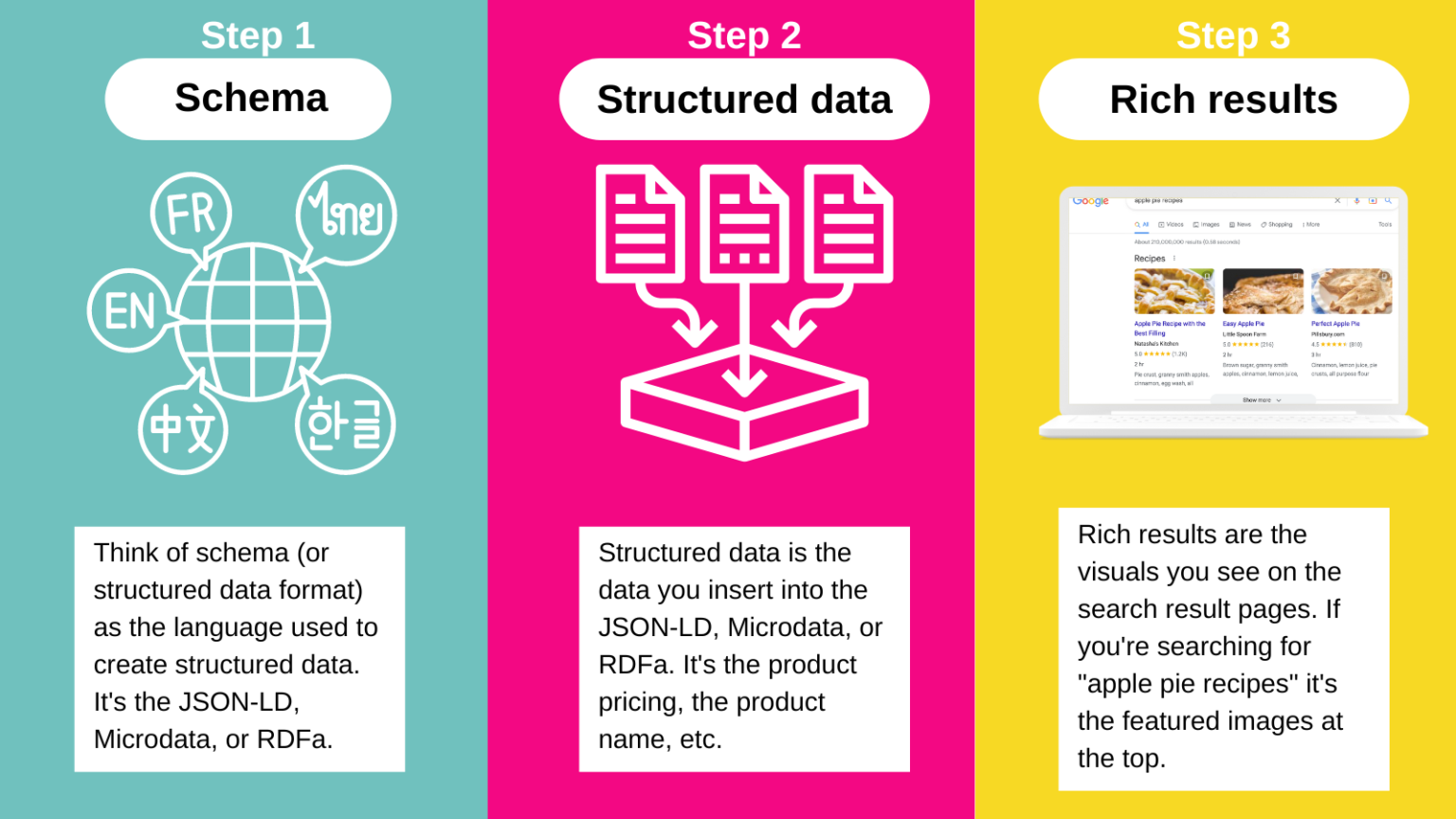
Image Source: SearchEngineLand
For white label SEO services, this distinction matters because proper implementation requires both vocabulary knowledge and technical execution. The best providers don't just add random schema types—they strategically select markup that aligns with each client's business model and content structure.
Key Benefits of Schema for SEO and Agencies
The advantages of structured data implementation extend far beyond basic SEO improvements. For agencies, schema markup represents a competitive differentiator that delivers measurable results clients can see.
1. Enhanced SERP Visibility
Schema markup is the foundation for rich snippets, knowledge panels, and other enhanced search results. When implemented correctly, your clients' listings stand out visually from standard blue-link results. This increased visibility translates directly to higher click-through rates, even when ranking positions remain the same.
Rich snippets can include star ratings for products and services, FAQ expansions, event details, pricing information, and more. According to search marketing studies, pages with rich snippets typically see CTR improvements ranging from 15% to 35% compared to standard listings.
2. Improved Local SEO Performance
For agencies serving local businesses, schema markup is particularly powerful. LocalBusiness schema helps Google understand key information like business hours, contact details, service areas, and customer reviews. This information feeds directly into Google Business Profiles and local map pack results.
Event schema helps local businesses promote upcoming activities, while Review schema can showcase customer testimonials directly in search results. These features are especially valuable for restaurants, retail stores, service providers, and other location-based businesses.
3. Better Context for Search Engines
Schema markup helps search engines understand content's meaning rather than just matching keywords. This improved context leads to better rankings for relevant queries and helps pages appear for related searches they might otherwise miss.
For example, a law firm's "Personal Injury FAQ" page with proper FAQ schema might rank for question-based queries even if those exact phrases don't appear in the content. The structured data tells Google that this page answers common questions about personal injury law.
4. Competitive Edge in Organic Rankings
Even when multiple pages rank similarly, Google’s rich results powered by schema markup often attract more clicks than plain text listings. This creates a significant competitive advantage, especially in highly competitive industries where small improvements in CTR can dramatically impact lead generation.
White label SEO services that understand this principle focus on schema types most likely to generate rich results for their clients' industries. They also monitor which competitors are using structured data and identify opportunities to differentiate their clients' listings.
5. Higher Client Retention for Agencies
Schema implementation demonstrates technical SEO expertise in a way clients can easily understand. When business owners see their listings enhanced with star ratings, pricing information, or event details, they immediately grasp the value of professional SEO services.
This visual impact makes schema markup an excellent tool for client retention and upselling additional services. Agencies can use rich result improvements to justify ongoing SEO investments and showcase their technical capabilities.
6. Support for Voice Search and AI-Driven Search
As voice search and AI-powered search experiences become more prevalent, structured data plays an increasingly important role. Voice assistants rely heavily on schema markup to provide accurate answers to spoken queries.
With Google's AI Overviews and other AI-driven search features, properly structured content is more likely to be selected as source material. This positions clients for success as search technology continues evolving toward more conversational and context-aware experiences.
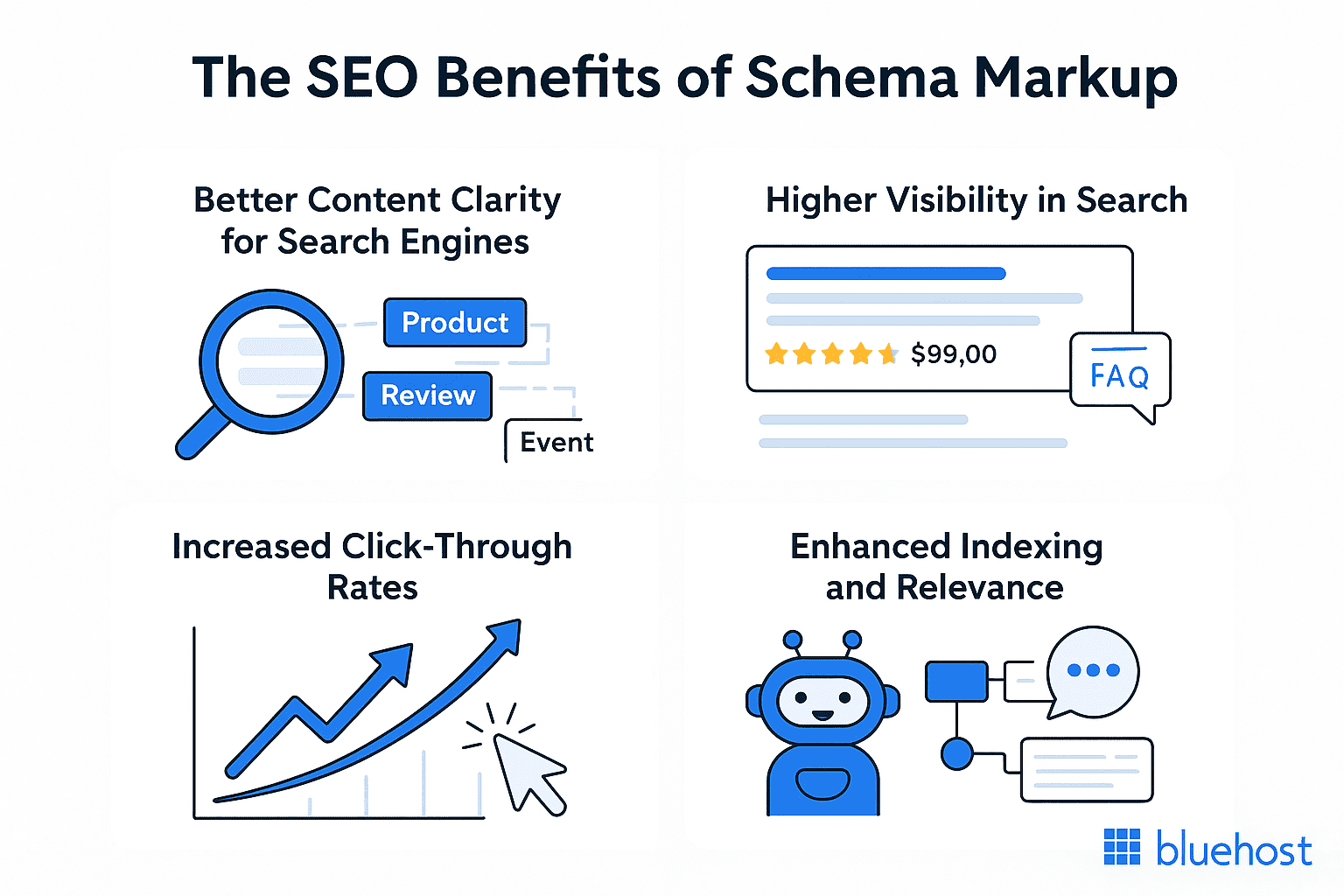
Image Source: Bluehost
Best Practices for Implementing Schema Markup
Successful schema implementation requires more than just adding markup to pages. The best white label SEO providers follow proven methodologies that ensure maximum impact while avoiding common pitfalls.
1. Choose the Right Schema Types
Not all schema types are created equal for every business. Effective providers start by analyzing each client's business model, content types, and target audience before selecting appropriate schema markup.
E-commerce sites benefit most from Product, Offer, and Review schema. Local service businesses need LocalBusiness, Service, and potentially Event schema. Content publishers should focus on Article, FAQ, and HowTo markup. The key is matching schema types to actual business objectives rather than implementing markup just because it exists.
2. Ensure Content-Data Alignment
One of the most critical rules in schema implementation is that structured data must accurately reflect visible page content. Adding markup for information that doesn't appear on the page can result in penalties and manual actions from Google.
Quality providers audit page content before adding schema markup. They ensure that every structured data element corresponds to information users can see and verify on the page. This approach builds trust with search engines and provides genuine value to users.
3. Use JSON-LD Format
While schema markup can be implemented using several formats, JSON-LD is Google's preferred method. It's easier to implement, maintain, and troubleshoot compared to Microdata or RDFa markup embedded directly in HTML.
JSON-LD markup is typically added to the page head or footer, keeping it separate from visible content. This separation makes it easier to update structured data without affecting page design or functionality.
4. Validate Before and After Implementation
Every piece of schema markup should be tested using Google's Rich Results Test and Schema.org's validator before going live. These tools identify syntax errors, missing required properties, and other issues that could prevent search engines from properly interpreting the markup.
Post-implementation monitoring is equally important. Quality providers track which pages are generating rich results and monitor for any markup errors that might develop over time due to content updates or technical changes.
5. Keep Schema Updated
Structured data requires ongoing maintenance, especially for businesses with frequently changing information. Outdated event dates, incorrect pricing, or old contact information can harm credibility and reduce click-through rates.
The best white label providers establish processes for keeping schema markup current. This might involve automated updates for certain data types or regular manual reviews for more complex markup.
6. Leverage Automation When Scalable
For agencies managing multiple clients, automated schema implementation can significantly improve efficiency. Many content management systems offer plugins or built-in features that generate structured data automatically based on page content.
However, automation should be used carefully. Generic, template-based schema markup often misses opportunities for customization that could provide greater SEO benefits. The most effective approach combines automated tools with manual optimization for high-priority pages.
7. Track Impact on Key Metrics
Schema implementation should be treated as a measurable SEO strategy, not just a technical checkbox. Quality providers track metrics like click-through rates, impressions for rich results, and keyword rankings before and after schema deployment.
This data helps agencies demonstrate ROI to clients and identify opportunities for further optimization. It also provides insights into which schema types deliver the greatest impact for different industries and business models.
The White Label Advantage: Why Agencies Shouldn't Go It Alone?
Managing schema markup across multiple client sites is no small task. It’s technically complex, requires ongoing updates, and demands deep expertise—often beyond what most agencies can handle in-house. Partnering with a white label SEO provider specializing in structured data offers clear advantages:
- Handle Technical Complexity With Ease – White label SEO providers manage the intricate process of schema markup, staying ahead of ever-changing Google guidelines and schema.org vocabulary updates to ensure compliance and effectiveness.
- Stay Industry-Relevant – They bring niche expertise and keep up with emerging best practices, so your clients’ structured data is always optimized for evolving search technology.
- Save Time & Focus on Strategy – Outsourcing frees agencies from the heavy lifting of markup development, testing, and troubleshooting, allowing more focus on SEO strategy, client relationships, and business growth.
- Scale Without the Growing Pains – White label teams can implement schema efficiently across dozens of client sites while maintaining consistent quality—perfect for agencies experiencing rapid expansion.
- Avoid Costly Mistakes – Incorrect schema can mean penalties, lost rich results, and wasted resources. Proven white label partners minimize these risks and deliver faster, more reliable results.
Core Schema Types Agencies Should Expect Providers to Implement
Understanding which schema types deliver the greatest SEO impact helps agencies set appropriate expectations for their white label partnerships. The most effective providers focus on markup types that align with client business models and search behavior patterns.
1. Local Business Schema
For clients serving local markets, the LocalBusiness schema is fundamental. This markup helps Google understand business location, contact information, hours of operation, and service areas. It directly impacts Google local pack rankings and Google Business Profile enhancement.
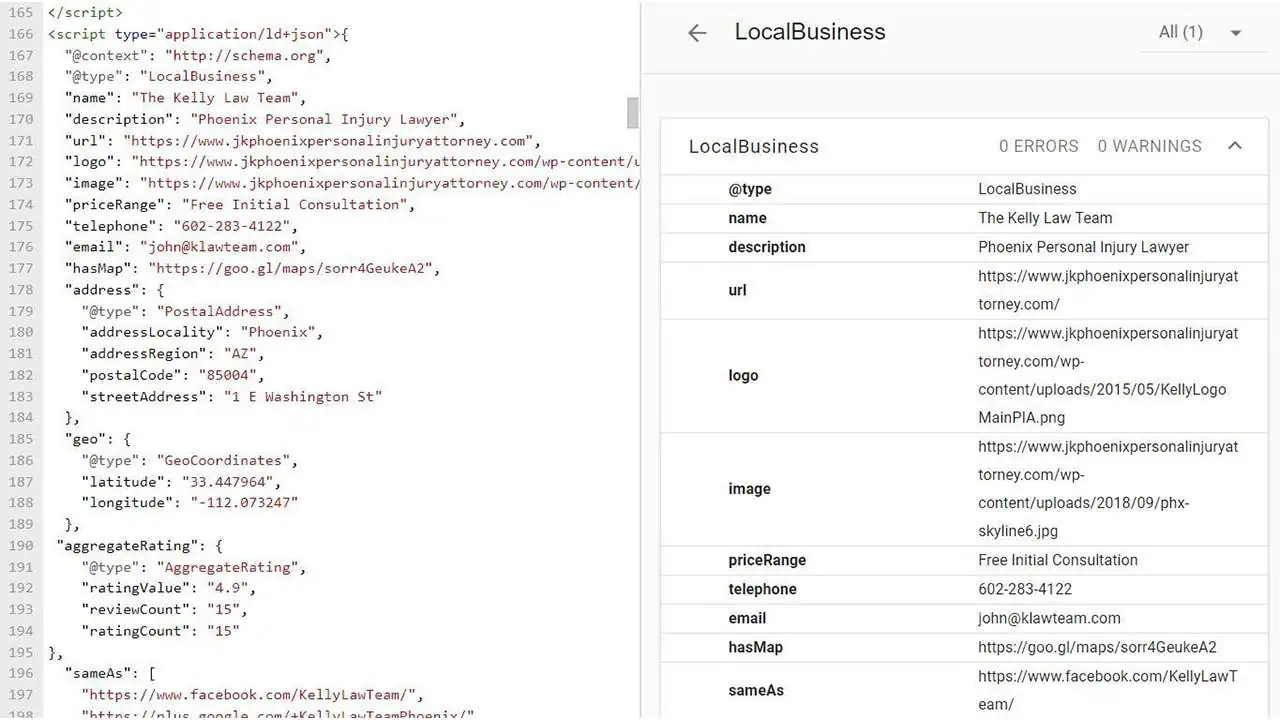
Effective implementation includes not just basic business information but also attributes like payment methods accepted, parking availability, accessibility features, and specific services offered. This detailed information helps businesses stand out in local search results.
2. Organization Schema
Organization markup establishes brand identity and credibility signals that benefit businesses of all sizes. It connects company information, social profiles, contact details, and founding information in a way that search engines can easily interpret.
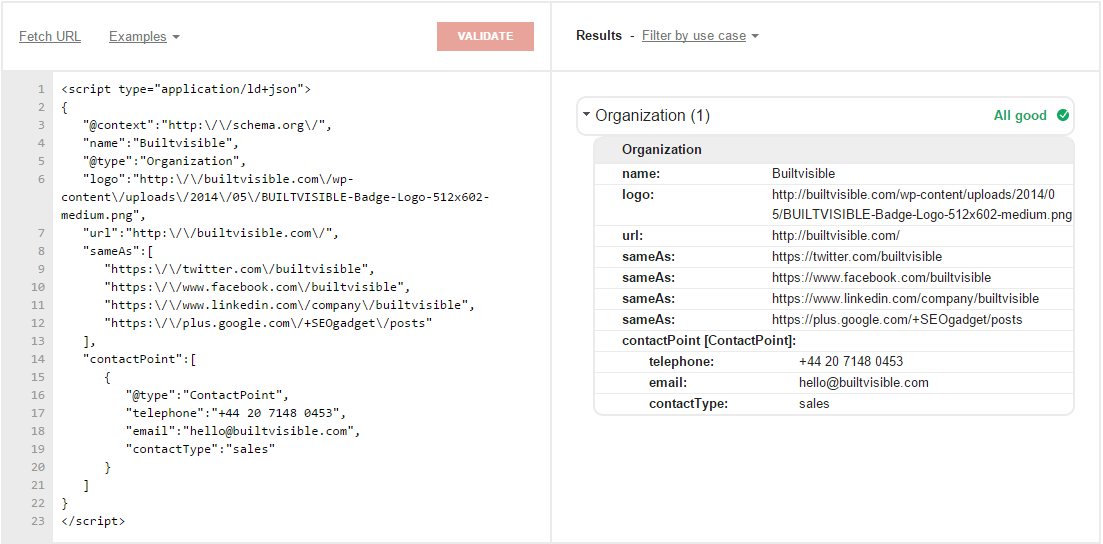
For businesses with complex organizational structures, providers should implement hierarchical organization markup that shows relationships between parent companies, subsidiaries, and different locations.
3. Product & Service Schema
E-commerce sites and service providers benefit significantly from detailed product and service markup. This schema type enables rich snippets with pricing, availability, ratings, and other purchase-relevant information.
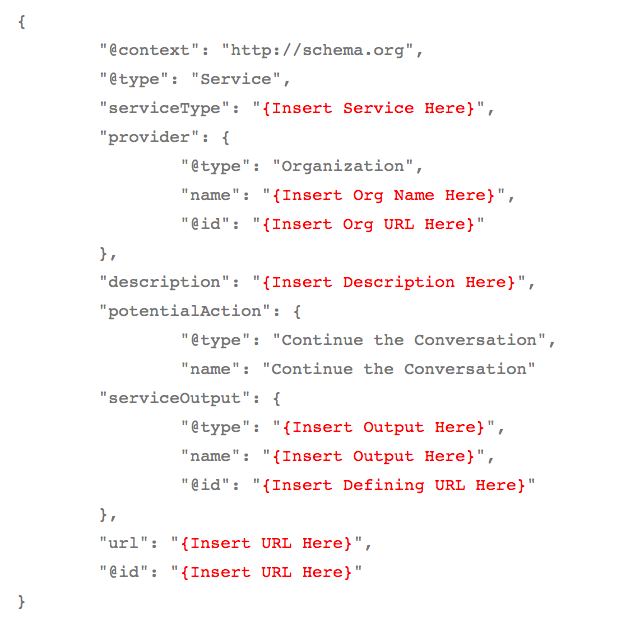
Beyond basic product information, advanced implementation includes attributes like shipping details, warranty information, return policies, and compatibility data. Service schema can highlight pricing ranges, service areas, and booking information.
4. FAQ & How-To Schema
FAQ and HowTo schema types are particularly valuable for capturing featured snippet opportunities and addressing voice search queries. These markup types help pages appear for question-based searches and provide structured answers that search engines can easily extract.
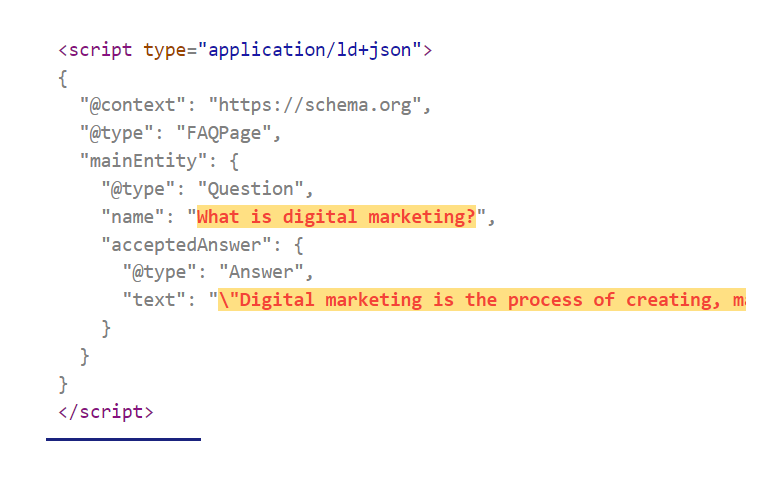
Quality implementation focuses on genuinely helpful information that addresses common customer questions or problems. The markup should reflect actual FAQ content or step-by-step instructions visible on the page.
5. Review Schema
Review markup helps businesses showcase customer feedback directly in search results. However, this schema type requires careful implementation to comply with Google's guidelines about review authenticity and representation.
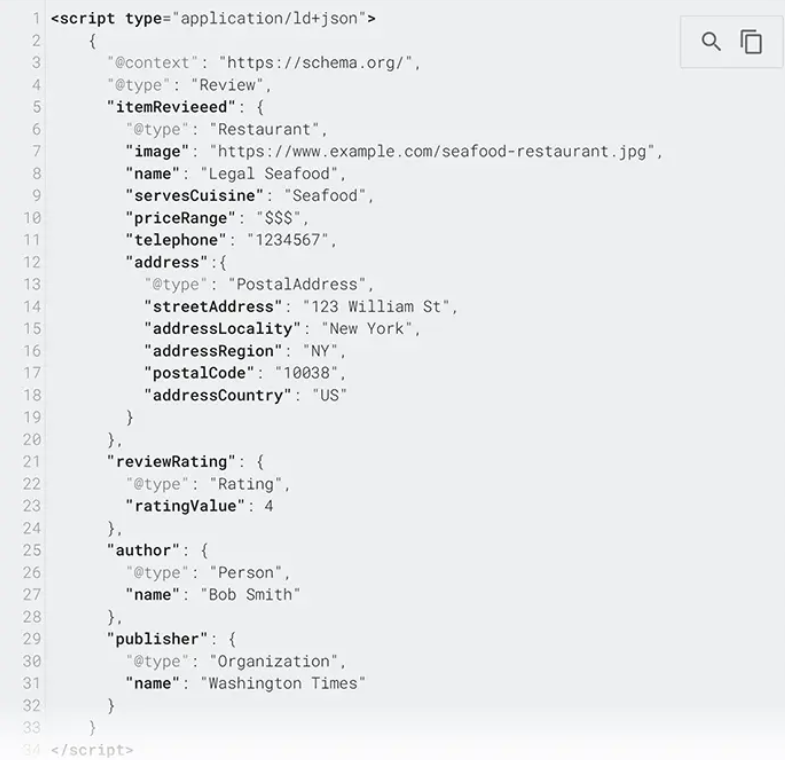
Providers should focus on aggregate rating markup for businesses with substantial review volumes rather than individual review markup, which is more restrictive and has higher requirements for compliance.
6. Emerging Schema Types
Forward-thinking providers stay current with new schema types that support evolving search technologies. Speakable schema helps content appear in voice search results, while VideoObject schema supports video-rich snippets.
As AI-driven search features expand, schema types that provide clear entity relationships and content structure become increasingly valuable for maintaining search visibility.
Measuring Success: Schema Performance Metrics That Matter
1. Ongoing measurement and optimization are essential for effective schema implementation. Agencies should expect white-label partners to provide clear reporting on structured data performance and business impact.
2. Click-through rate (CTR) improvements from rich snippets are the most direct measure of schema success. Pages with rich results often see CTR increases of 15% to 40% depending on schema type and industry.
3. Impression data for SERP features reveals how often schema markup triggers enhanced results. Google Search Console’s Performance report shows which pages generate rich results and how often they appear for target keywords.
4. Keyword ranking improvements often follow schema implementation, especially for:
- Long-tail queries
- Question-based searches
- Structured data helps pages appear for more diverse query variations.
5. Quality providers offer dashboard reporting that:
- Tracks metrics over time
- Correlates schema changes with performance improvements
- Helps agencies demonstrate ROI to clients
- Identifies opportunities for further optimization
Common Pitfalls White Label SEO Providers Help Agencies Avoid
Schema markup implementation involves numerous technical and strategic pitfalls that can waste resources or harm search performance. Experienced white label providers help agencies navigate these challenges effectively.
1. Implementing Irrelevant Schema Types
One of the most common mistakes is adding schema markup that doesn't align with page content or business objectives. Some providers implement every available schema type without considering relevance or impact potential.
Quality providers audit page content and business models before selecting appropriate markup. They focus on schema types most likely to generate rich results and provide genuine user value.
2. Incorrect Syntax and Technical Errors
Schema markup requires precise syntax and proper property relationships. Small errors can cause search engines to ignore the markup entirely, wasting implementation effort. Experienced providers use validation tools throughout the development process and implement quality assurance procedures that catch technical errors before markup goes live.
3. Overuse or Spammy Review Schema
Review schema is heavily regulated by Google, and incorrect implementation can result in manual penalties. Some providers add fake reviews or manipulate rating displays in ways that violate search engine guidelines.
Reputable providers implement review schema conservatively, focusing on authentic customer feedback and aggregate ratings that accurately represent business reputation.
4. Failing to Align Schema With Page Content
Search engines penalize websites that use structured data to markup content that isn't visible to users. This includes hidden text, misleading information, or data that doesn't match actual page content.
Quality providers ensure every schema element corresponds to visible, accurate information that users can verify on the page. This approach builds trust with search engines and provides genuine user value.
5. Duplicate or Generic Markup
Template-based schema implementations often result in duplicate or overly generic markup across multiple pages. This approach misses opportunities for customization and can dilute the effectiveness of structured data signals.
Effective providers customize schema markup for each page's unique content and purpose. They avoid generic templates in favor of tailored implementations that maximize SEO impact.
6. Non-Compliance With Google Guidelines
Google regularly updates its structured data guidelines, and non-compliant markup can result in rich result penalties or manual actions. Staying current with these changes requires ongoing attention and expertise.
Experienced providers maintain up-to-date knowledge of guideline changes and proactively audit client implementations for compliance issues. They also monitor Google's official communications about structured data best practices.
7. Improper Nesting and Entity Relationships
Advanced schema implementation involves complex entity relationships and nested markup structures. Incorrect nesting can confuse search engines and reduce the effectiveness of structured data signals.
Quality providers understand schema.org vocabulary relationships and implement nested markup structures that accurately represent complex business and content relationships.
8. Skipping Multilingual and Regional Optimization
Businesses serving multiple languages or regions require specialized schema implementation that addresses localization needs. Generic markup often fails to capture these nuances effectively.
Experienced providers implement language-specific and region-specific schema markup that helps businesses compete effectively in international and multilingual search markets.
Future Trends: Structured Data in the AI-First Search Era
The role of schema markup continues evolving as search engines integrate more AI-powered features and conversational search experiences. Understanding these trends helps agencies choose a white label SEO company prepared for the future of SEO.
- AI-Driven Search Experiences – Google’s AI Overviews and other AI-generated results rely heavily on structured data to understand content and extract accurate information. Pages with rich schema are more likely to be featured in these enhanced search results.
- Voice Search Optimization – Structured data ensures business details, product specs, and service descriptions are easily understood by voice assistants, improving accuracy for spoken answers.
- Visual Search Integration – Product and image schema boost visibility in visual search results, making structured data a key factor in future image and video SEO strategies.
- Entity-Based SEO Growth – Search engines are prioritizing real-world entity recognition and relationship mapping. Schema markup provides the foundation for this shift beyond keyword matching.
- Future-Ready Implementation – Leading white label providers are already testing new schema types and strategies for emerging technologies, adapting quickly to maintain client competitiveness.
How DashClicks Transforms Schema Implementation for Agencies?
DashClicks understands that effective schema markup requires both technical expertise and strategic thinking. Their white label SEO services combine automated tools with expert oversight to deliver comprehensive structured data solutions for agency partners.
The DashClicks approach begins with detailed site audits that identify schema opportunities aligned with each client's business model and competitive landscape. Rather than applying generic templates, their team customizes markup implementation based on industry best practices and individual business objectives.
Their platform provides agencies with transparent reporting on schema performance, including rich result generation, click-through rate improvements, and keyword ranking changes. This data helps agencies demonstrate clear ROI to clients and identify opportunities for ongoing optimization.
DashClicks maintains current expertise on schema.org vocabulary updates, Google guideline changes, and emerging structured data trends. This knowledge ensures that client implementations remain compliant and effective as search technology continues evolving.
For agencies seeking to scale their SEO offerings without expanding internal technical teams, DashClicks provides the expertise and tools needed to deliver professional schema implementation across multiple client accounts efficiently.
Ready to Transform Your SEO Results With Professional Schema Implementation?
Schema markup and structured data represent more than just technical SEO tactics—they're essential tools for competing effectively in modern search results. The agencies that recognize this shift and partner with experienced white label providers will deliver superior results for their clients while building more profitable service offerings.
The key is choosing partners who understand that effective schema implementation requires strategic thinking, technical precision, and ongoing optimization. Look for providers who customize their approach based on client needs rather than applying one-size-fits-all solutions.
As AI-powered search features continue expanding and voice search becomes more prevalent, structured data will only become more important for maintaining search visibility. The time to build schema expertise into your SEO offerings is now, before your competitors gain an insurmountable advantage.
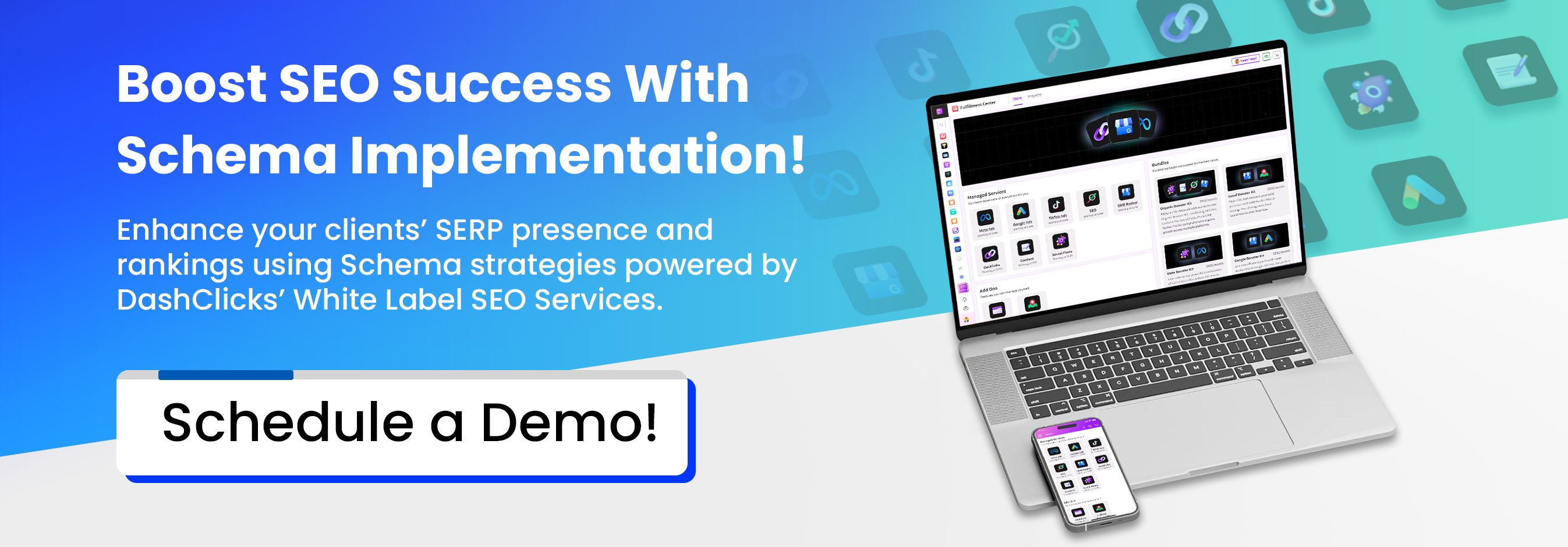


.svg)

.svg)
.svg)
.svg)
.svg)
.svg)

.svg)




.svg)
.svg)
.svg)
.svg)
.svg)